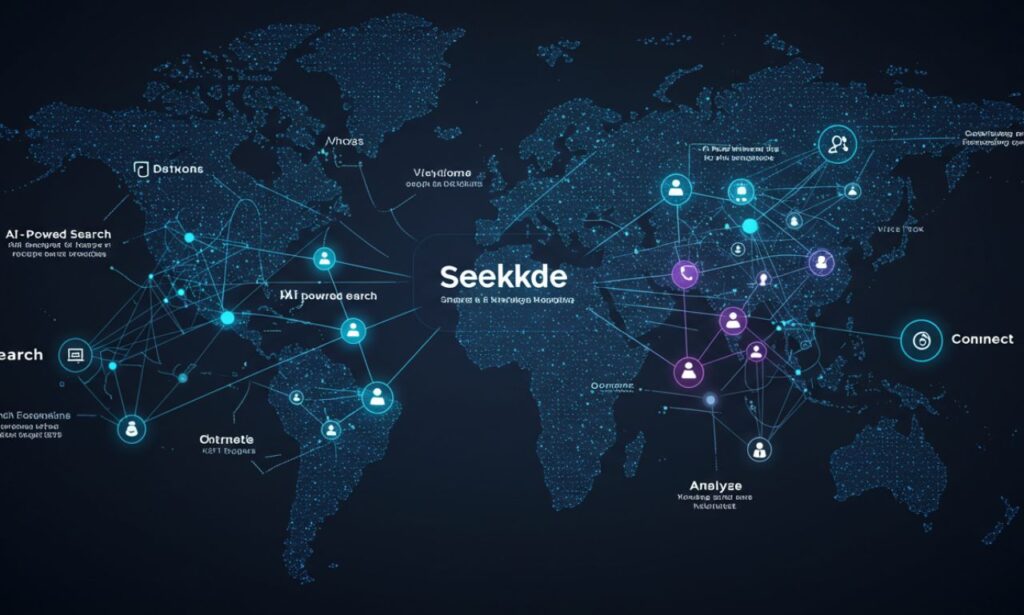Seekde is a digital ecosystem combining smart search, knowledge mapping, and adaptive learning to turn online information into clarity. In plain terms, rather than just giving you a list of links for your query, Seekde tries to understand what you really want, show how ideas connect, and improve its help as you use it more.
In an age of information overload — so many articles, blogs, posts, and data — Seekde aims to help users cut through noise, find reliable content, and build understanding rather than scavenging piece by piece.
Key Features of Seekde
Advanced Search Intelligence
Seekde goes beyond matching keywords. It tries to interpret context, intent, maybe even follow-up questions, to retrieve more relevant information.
Knowledge Mapping & Connections
One of the things that makes Seekde different is showing how topics, facts, ideas are related. Instead of isolated results, it provides “maps” of knowledge — how one concept links to others. This helps users explore deeply.
Adaptive Learning
Seekde learns from interactions. As you search, click, refine, it adjusts results to match your style, preferences, or needs. Over time, it gets better at showing what is helpful to you.
Credibility & Source Awareness
Because many surfaces of the internet include unreliable or misleading content, Seekde emphasizes trustworthy sources and tries to help users see what’s reliable and what’s less so.
Unified & Organized Presentation
Instead of opening dozens of tabs, Seekde aims to organize information in fewer, more meaningful sections: summaries, related topics, perhaps visual maps — helping users navigate efficiently
Who Uses Seekde & Use Cases
Students & Learners
-
For deep research: getting not just definitions but connections between concepts.
-
For homework and study: understanding cause-and-effect, context, history, etc.
-
For exploring new topics: as a learning companion
Teachers & Educators
-
As a tool to prepare lessons with well-organized content.
-
To help students understand links between ideas rather than just memorizing.
-
To source reliable, relevant, and rich content.
Professionals & Researchers
-
When gathering information across studies or reports. Seekde helps see relations among findings and data.
-
For decision-making where context matters. E.g., in business, market research, policy, etc.
General Users & Curious Minds
-
Everyday use: asking questions, discovering trustworthy info, exploring topics of interest.
-
For fact checking, verifying claims found online. Seekde supports richer understanding not just quick answer.
Benefits of Using Seekde
-
Time savings
Instead of manually opening many links and piecing together what’s credible, Seekde helps you get to relevant content faster. -
Better understanding
Seeing how ideas connect can help form deeper insight, not just superficial knowledge. -
More personalized results
Adapts to your style, past searches, knowledge level. -
Improved decision-making
Especially for professionals or researchers, having organized, trustworthy info supports better choices. -
Reduced misinformation risk
Emphasis on credible sources means less likely to fall prey to clickbait, pseudo-facts, or low-quality content.
Limitations & Challenges
-
Data freshness & coverage: Some sources may lag, or new content might not be immediately included.
-
Reliance on source reliability: Even if Seekde tries to use credible sources, underlying information could be flawed.
-
Interpretation errors: NLP isn’t perfect—there may be mis-understanding of subtle contexts or nuance.
-
Bias & personalization risk: If the algorithm adapts too much, you might get echo-chamber effects (only what aligns with past behavior).
-
Privacy concerns: To adapt well, Seekde may collect data on users’ search behavior; transparency is needed.
Getting Started with Seekde & Best Practices
-
Begin by using natural language queries: instead of “global warming effects,” ask “how global warming affects ocean life” or “why do glaciers melt faster now?” This helps Seekde give more holistic results.
-
Use the mapping features: explore related topics rather than stopping with the first answer. This helps build deeper context.
-
Provide feedback: if Seekde has features like rating, selecting better/worse results, do that; helps adaptive learning.
-
Check sources: even though Seekde emphasizes credible source, always verify especially when info is critical (medical, legal, etc.).
-
Clear your browsing/search history or set preferences if you don’t want all results biased by past behavior
Future Directions & Potential of Seekde
-
Integration with AI assistants or chat tools: conversational search, voice support, follow-up questions.
-
More visualization: interactive knowledge graphs, timelines, concept maps.
-
Collaboration features: share knowledge maps, curated collections, collaborative research.
-
Domains specialization: versions tailored for medicine, law, engineering, etc., with domain-specific source filters.
-
Better privacy & transparency: giving users control over data, clear policies, opt-in/out settings.
Conclusion
Seekde represents a shift in how we use search: from quick keyword matches and list of links, to understanding, mapping, and meaningful clarity. It holds promise for students, professionals, lifelong learners, and anyone overwhelmed by the vast amounts of information online.
While it has limitations (as with all emerging technologies), its core strengths — adaptive search, knowledge mapping, credible sources — offer valuable tools in today’s digital age.
If you’re looking to stay informed, make better decisions, and not just skim the surface of knowledge, Seekde is worth exploring.






